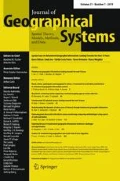Abstract.
We provide an overview of recent results in spatial logic, and discuss their relevance for the development of formal representations of geographic knowledge. Several proposed “spatial” logics are explored. We discuss their applicability to computational geography, and ultimately investigate their credentials as logics of space. A “non-revisionist” adequacy criterion for spatial logics is proposed, according to which a logic is truly a spatial logic only if all consistent sets of sentences of that logic are realizable in a classical model of space. Various proposed spatial logics can be shown not to satisfy this criterion. The observations constitute incompleteness results for certain spatial logics, because they show that consistent sets of formulae in these logics do not have models of the intended sort. The implications of these results are discussed with reference to the role of logics as spatial description languages for geographical information systems (GIS). Finally, we describe a complete calculus for plane mereotopology, which has recently been developed.
Similar content being viewed by others
Author information
Authors and Affiliations
Rights and permissions
About this article
Cite this article
Lemon, O., Pratt, I. Logics for geographic information. J Geograph Syst 1, 75–90 (1999). https://doi.org/10.1007/s101090050006
Issue Date:
DOI: https://doi.org/10.1007/s101090050006



